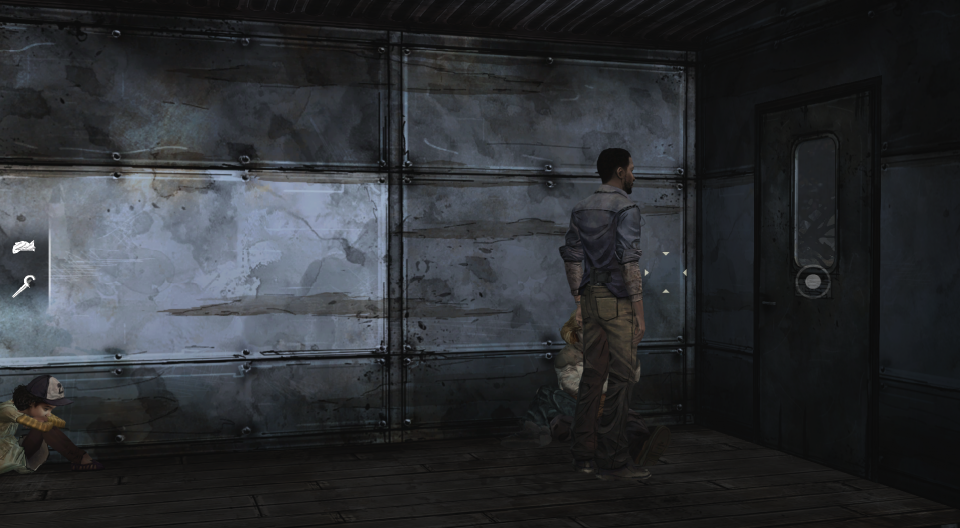Missing An Episode: The Walking Dead and Bugs
By Little_Socrates 1 Comments
The Walking Dead series by Telltale Games, in case you’ve missed out on it, is easily one of the most impressive role-playing games of 2012. Mind you, it’s got none of the traditional RPG level-up or combat mechanics in place; it eschews them for quality conversational roleplaying in its place. The characters feel extremely relatable and human, and yet the game places you in incredibly difficult situation after incredibly difficult situation, leaving many people struggling to make choices under quite duress. It’s a type of roleplaying more related to the Lupin the Third tabletop game, or full-on conversational roleplaying games like FIASCO. The episodic delivery of the game also lends the experience a lot of its power; as opposed to getting tired of these characters and the style of the game by playing through the experience in three days, the delivery system has made the game a year’s worth of agonizing. The comic-book aesthetic, intelligent dialogue, and quality voice-acting help an already interesting game become a gaming-wide phenomenon, an early front-runner for Game of the Year in the eyes of many players.
At least, until you encounter your first progress-stopping bug. Maybe the game crashes on you three times, as it did with my fellow podcast host . (Speaking of which, we’ve started recording again and releasing on Thursdays! And out show is only an hour long per episode now, to accommodate the fact that none of you know who we are yet.) Maybe the framerate and loading problems on the PS3 version cause normal scenes to take entire minutes longer than they’re supposed to take, ruining the dramatic timing and sense of storytelling the game can bring to the table.
Or, if you’re extremely unlucky, you encounter a bug so unfightable that it makes you completely incapable of completing an episode.

There’s Lee. He’s on a train, and from what I’ve gathered, he is somewhere between a half hour and an hour from the end of Episode 3. As you can see, there’s a door that’s meant to be opened, and the cursor is just short of clicking on the door. Unfortunately, the cursor will NOT move to the door; it seems to hit an invisible forcefield at that point on the screen, short of allowing me to continue the game. I’ve tried altering my resolution, going into windowed and fullscreen mode, using a 360 controller, uninstalling the game and reinstalling it, rewinding my save, but none of it will solve my bug. Seriously, if there’s a chance it’s a driver-related issue (I know very little about computer support) inform me as I’d love to at least prevent the problem from happening again. I’d email TellTale tech support, but they don’t have an email address that I can find, instead relegating all tech support to a forum full of other complaints, including one identical to my own.
Sadly, the bug was not patched out with the release of Episode 4, and my copy of Episode 3 remains broken. I’ll never be able to finish the episode on this playthrough, forcing me either to start the entire game over and hope it works or play through on another console, buying the game again.
But the game will let you continue past a broken episode, and so, like any good TV viewer, I caught up on what I’d missed with the closest thing I have to Entertainment Weekly; Patrick’s “Faces of Death” retrospectives. And then I’ll move on to the next episode. Yes, I don’t get to choose whether Kenny or I performed a horrible deed shortly after my bug entered, but I’m moving forward all the same.
I was pretty damned sure the third episode of The Walking Dead was the best as of yet while I was playing it, and actually watching what I missed and reading Patrick’s wrap-up confirmed it. It’s emotionally heart-wrenching throughout, and I’m not ashamed that I got a bit misty watching the climactic scene. Long Road Ahead is a hard, hard episode, and the dialogue had been raised far beyond the standard for the medium. I’ll forever be sad I didn’t get to play through the episode in its entirety on this first playthrough.
But, of course, Around Every Corner has been released, and it’s time to move on.
And I expected it to be harder to move on. But the fourth episode of The Walking Dead is still so emotionally resonant and so much more mechanically engaging than any of the episodes before it that it’s easy to forget that frustration. It’s not flawless; an honest review of the episode would probably call out some of the humor at awkward moments. But this episode is maybe better than Long Road Home, the episode which made me truly fall in love with this series.
When I came up with this blog, I hadn’t played Around Every Corner yet. In fact, I’d written what will (probably) be the large majority of the blog before I booted up the episode. I expected to still feel burned about missing Episode 3. Maybe it’s just because I got lucky and the game “randomly generated” choices I agreed with for everything I missed, but I felt I was able to fill in the gaps and move on with one of my favorite gaming experiences this year.

I can’t turn around on this; buggy games are still a problem. The Walking Dead is pretty lucky it’s in this episodic format, or else I’d still be bitter and probably unable to finish the game. Then there’s the people out there who lost their saves in Fez. One of them is a good friend of mine, and he’ll be part of Nerf’d Game of the Year discussions; the game’s practically built for him, and he only lost a good half-hour or so of play time, but it’ll still weigh heavy on his mind. It’ll weigh heavy on mine, too.
But heavy weight defines Game of the Year. Whether it’s the inconsequentiality of a game like Saints Row: The Third, the mistakes The Witcher 2 makes in allowing you to define your own Geralt, the long, dreary section of Red Dead Redemption that is Mexico, or the fact that Mass Effect 2 has characterization problems and trades primarily on promises, Game of the Year asks us to really put everything in perspective and evaluate what we’re doing best and what we need to do better as we move forward. So long as the people debating Game of the Year work to improve the industry in whatever way they can, large or small, it can actually matter. Yes, there’s the perfectly appropriate act of just writing up your own top ten list for giggles and then not talking or evaluating games for the rest of the calendar year, but that’s a lot more masturbatory than what I’m trying to talk about.
The whole Game of the Year conversation forces us to come together and decide what matters most to us at any given time. Last year, I’d probably say it’s safe to assume most gamers put bugs and narrative on the wayside to get a highly expansive experience in Skyrim; I opted for narrative in Ghost Trick and style in Saints Row: The Third. The year before, it’s a bit tougher, but narrative and polish are both pretty notable for Mass Effect 2 and Red Dead Redemption, while the more mechanically-oriented people tended to opt for Civilization V or StarCraft II. Again, I opted for a slightly different alternative in Deadly Premonition and Super Meat Boy.
And so long as these conversations remain two-sided, they still matter. Hell, even some reviews and lists nobody ever reads can matter; Matthew Floratis (aka ) is writing high-quality essays and reviews over on Screened that, well, almost nobody is reading, but he’s getting to be a better writer and viewer as the year goes on. If he continues to watch movies and comment on them rather than just give up because the audience is so small, it’ll be a worthy cause.
But conversation shapes us. You never know which forum user who reads your review is going to turn out to be the next popular designer or important programmer of the month. And, perhaps more pertinent to each and every one of us, we shape the tastes of the people around us, causing our friends to find things more similar to the things we introduce to them.
This blog was ready to go, waiting simply to be edited and submitted, before a conversation happened that changed everything again.
The Walking Dead deleted my brother’s save when he booted up Episode 4.
And so the conversation about bugs attacking the experience of The Walking Dead continues, even after I’ve moved past my primary frustration. I’ll have a lot more to say on that experience this week on Nerf’d, as we’ll primarily be discussing TWD, Dishonored, and XCOM. But we can continue the conversation beyond the show, right here and right now.
